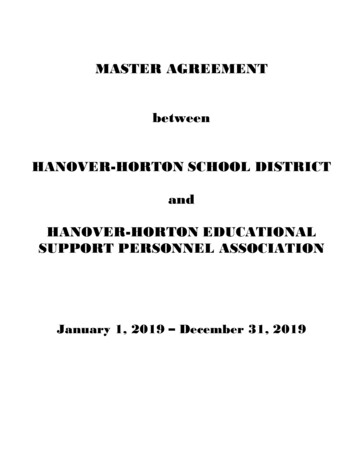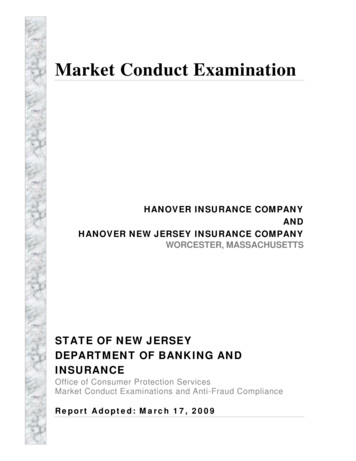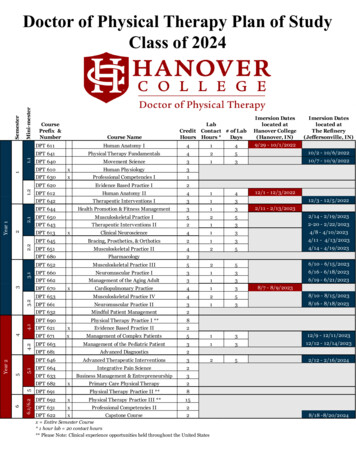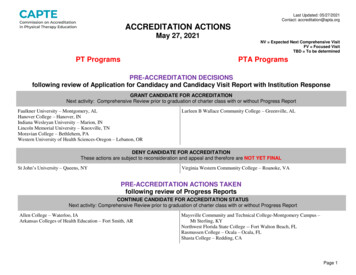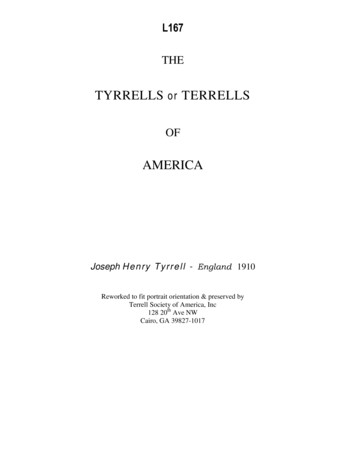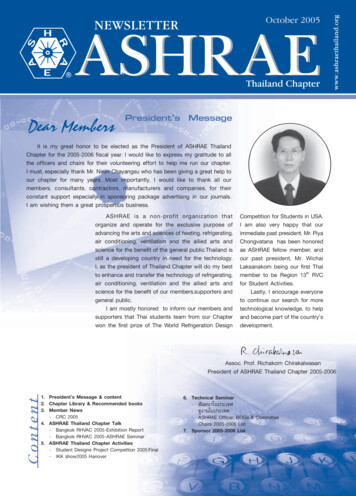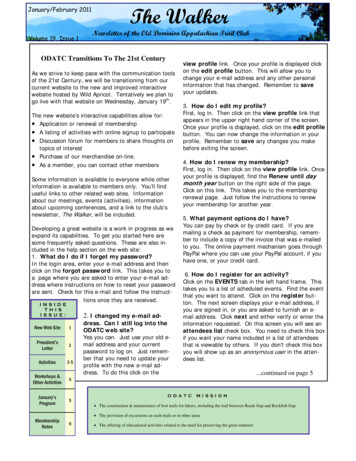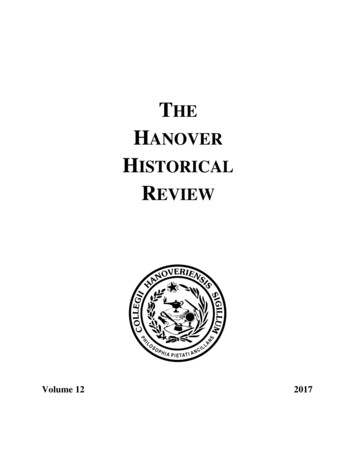
Transcription
THEHANOVERHISTORICALREVIEWVolume 122017
GUIDELINES FOR SUBMISSION OF MANUSCRIPTSThe Hanover Historical Review (HHR) Editorial Board welcomes submissions ofessays, document transcriptions, and book reviews of a historical nature from anydiscipline.Manuscripts must be prepared in conformity with The Chicago Manual of Style in12-point Times Roman font, double-spaced (including footnotes) and with pagesnumbered.Submissions should consist of three hard copies delivered, plus a digital copysubmitted by email attachment as a Microsoft Word document, to ProfessorMichael Raley (raleyjm@hanover.edu). Because all submitted manuscripts will beevaluated anonymously, the author’s name should appear only on the title page.There should be no identifying markers (including headers and hidden texts) withinthe body of the paper. Please print your paper on the front sides of the pages only(single-sided).Articles should not exceed 3,000 words without the prior approval of the HHReditors. Please note that submissions accepted for publication may be edited toconform to the HHR’s style. The HHR editors remain the final arbiters of length,grammar, and usage. However, they will endeavor to consult with authors withregard to any changes made in the interest of clarity and economy of expression.The HHR disclaims responsibility for any statements, either as fact or opinion,made by contributors. 2017 THE HANOVER HISTORICAL REVIEW / Hanover Collegeii
THE HANOVER HISTORICAL REVIEWVolume 12Spring 2017Senior EditorMersadi’s dā CurtsingerJunior EditorsCaroline Brunner and Hannah MarkisohnEditorial BoardJenna AuberCaroline BrunnerAbigail CarringtonMersadi’s dā CurtsingerJacob DomalewskiRebecca DukeMeghan LanterJames MacumberHannah MarkisohnFalyn MoncriefHope WestmorelandEric WoodruffManaging EditorsDaniel P. Murphy, Professor of HistoryJ. Michael Raley, Associate Professor and Chair, Department of HistoryFinancial SupportDepartment of History and Hanover CollegePrintingCarol Persinger, Mailroom ServicesThe HANOVER HISTORICAL REVIEW is dedicated to the promotionof excellence in undergraduate scholarship and writing.iii
TABLE OF CONTENTSForeword . . . . . . . . . . . . . . . . . . . . . . . . . . . . . . . . . . . . . . . . . . . . . . . . . . . . . . . . . . . . . . . . . . . . vDaniel P. Murphy and J. Michael Raley, Managing EditorsPresident Lambert’s Inaugural AddressHanover College, October 3, 2015Education for “A Tough Mind and a Tender Heart” . . . . . . . . . . . . . . . . . . . . . . . . . . . . . . . . . . . 3President Lake Lambert IIIStudent EssaysThe Influence of Pope Gregory VII and the Gregorian Reform on Pope Urban II:Differences in Motives and Agendas with Respect to the First Crusade . . . . . . . . . . . . .11Trent A. TaylorThe Struggle for the Conquest of Antioch (1097-1098): Muslim and Christian Perspectivesof a Critical Battle during the First Crusade . . . . . . . . . . . . . . . . . . . . . . . . . . . . . . . . . . .19Mersadi’s Dā CurtsingerThe South Bend Fugitive Slave Case: How Varying Attitudes Towards SlaveryAffected the Outcome . . . . . . . . . . . . . . . . . . . . . . . . . . . . . . . . . . . . . . . . . . . . . . . . . . . .51Claire HarveyKappa Alpha Theta at Hanover College, 1882-1899. . . . . . . . . . . . . . . . . . . . . . . . . . . . . . . . . . .63Jenna AuberThe Soviet Sports Machine. . . . . . . . . . . . . . . . . . . . . . . . . . . . . . . . . . . . . . . . . . . . . . . . . . . . . . 71Hannah MarkisohnOutstanding Freshman Essays 2016-2017World War I: The Lost Generation’s Legacy in Literature . . . . . . . . . . . . . . . . . . . . . . . . . . . . . 87Sara RutkowskiReinhard Heydrich’s Kristallnacht Order: A German Cultural Catalyst . . . . . . . . . . . . . . . . . . .93Eric Woodruffiv
FOREWORDThe early 1990s were an exciting time for the Hanover College History Department. New hiresand a revision of the curriculum had energized the faculty. Students were dynamic and energetic.The time was right for ambitious projects.Aided by supportive colleagues and enthusiastic students, Professor Frank Luttmer tookthe lead in proposing a journal that would publish student papers and documents related to thefield of history at Hanover College. Submissions could come from students in any department ofthe College. An editorial board of students would select the papers and documents chosen for thejournal, and also edit and annotate them as needed. The first student editorial board was headedby Valerie C. Parsons. She was assisted by Starratt Alexander, James Bednar, Christina Hartlieb,Lisa Obringer, Erec Reichardt, David Shine, Jr., and David J. Voelker. Professor Luttmerprovided support to the editors in the early stages of preparing the journal, while ProfessorDaniel Murphy helped oversee the final copyediting for the printer.The inaugural issue of The Hanover Historical Review appeared in Spring 1993.Featuring several strong student papers and a symposium on James Agee and Walker Evans’ LetUs Now Praise Famous Men (1941), the journal was a great success. The HHR flourished for therest of the decade and into the beginning of the next century, but was published only sporadicallyafter Professor Lutmer’s illness and untimely death.At the outset of the 2016-17 academic year, the Hanover College History Departmentdecided to resume publication of the Hanover History Review, provided that we could findsufficient support for this project among our students. Twelve of our students immediatelyvolunteered to serve on the HHR’s editorial board: Jenna Auber, Caroline Brunner, AbigailCarrington, Mersadi’s dā Curtsinger, Jacob Domalewski, Rebecca Duke, Meghan Lanter, JamesMacumber, Hannah Markisohn, Falyn Moncrief, Hope Westmoreland, and Eric Woodruff.Senior Medieval and Renaissance Studies major Mersadi’s dā Curtsinger agreed to serve as theSenior Editor for the HRR this year, while Caroline Brunner and Hannah Markisohn served asJunior Editors. Working with this group of eager and diligent students has turned out to be agreat joy for us faculty members. The result of their diligent efforts may be found within thecovers of this latest volume of the HHR.Throughout the 2016 fall semester, the HHR editorial board met every other week onThursday evenings at 7 p.m. Because the HHR had not been published since 2011, our first taskswere to discuss, review, revise, and finalize the journal’s Submission Guidelines. This requiredupdating the language to include electronic submissions. Although the 2017 volume of the HHRcontains only essays, the board members wanted to make it clear that, in the future, documenttranscriptions and translations, as well as book reviews of a historical nature from any discipline,will also be accepted for publication. Other concerns included word count and the need for allsubmissions to conform to The Chicago Manual of Style. Additionally, the board drafted a Callfor Papers with an initial deadline of January 20, 2017. Thereafter the board members visitedevery history-related class being taught here on campus during the 2016 fall term to promote thev
HHR and publicize the Call for Papers, the flyer for which was circulated by email attachment inaddition to being printed and posted in prominent locations throughout the campus. The boardmembers also voted unanimously to invite President Lambert to contribute an essay to this year’sHHR, and in response he has graciously granted us permission to publish his inaugural address atHanover College from 2015. This is fully in keeping with the history of the journal, which in2001 published the inaugural addresses of eight Hanover College presidents, past and present, ina special edition of the HHR honoring the 175th anniversary of the College.The board members also decided early upon a process by which they would review thesubmissions anonymously. Only Professor Raley would know the identity of the authors until theessays had been reviewed by the board members. This the board regarded as especially importantat a small liberal arts college such as Hanover College, where everyone knows everyone else;beyond this, however, a few of the board members wished to submit essays for consideration,and to ensure impartiality here Professor Raley distributed these, minus their authors’ names, toother members of the board for anonymous peer review.Eight specific criteria guided the board’s reviews:1. Does the essay have a clear thesis that is supported with focused arguments andplausible evidence? (If yes, please also state the thesis.)2. Is the thesis supported with an ample supply of primary sources, critically interpretedfor the reader?3. Is the author’s argument placed within the field of current scholarship on the subject(historiography)?4. Does the essay make a substantive contribution to our knowledge of the subjectmatter? In other words, does the essay advance the current scholarship in newdirections?5. Are the footnotes/endnotes correctly formatted in Chicago Style? Do they showevidence of attention to detail?6. Is the writing style clear and fluid? Is the argument interesting?7. Does this still seem like a paper written hurriedly for a class, or has the authorcarefully revised the essay for consideration by the Hanover Historical Revieweditorial board?8. What specific revisions or additions would you suggest that the author make toimprove the article pending its acceptance for publication?Following the review process, the authors of the submissions were provided withsummaries of the board members’ comments. The review process, the board decided, wouldyield one of three ratings: (1) accept for publication as is (or with only minor editing required);(2) revise and resubmit (typically requiring more research and substantive revisions and/oradditions as well as reediting the prose and reference notes); or (3) reject for publication. Thisyear we rejected no submissions outright, though some authors chose not to revise and resubmitvi
their work. Those who did revise and resubmit their work were expected to pay close attention tothe comments and suggestions for substantive revisions as well as for the editing of the text andformatting of the notes that had been provided by the board members in their reviews. The Juniorand Senior Editors of the HHR took over from here, reading all essays still under considerationagain and suggesting editorial grammatical and format changes for consistency and clarity.Professors Murphy and Raley oversaw the final edit of the journal, which was printed on campusby Carol Persinger.What struck us as faculty members was the seriousness and dedication with which thesetwelve students and also the authors of the articles appearing in this volume approached theirtasks. Certainly each of them was already sufficiently burdened with college assignments,athletic commitments, club and student senate responsibilities, rehearsals for campus musicalorganizations, and part-time employment, and yet each gave willingly and freely of his or hertime to make this project come to fruition. In the process, these students not only performed aworthy public service, but they also learned a great deal about the anonymous peer-reviewprocess employed by academic publishers. The writing and research skills of these HHR boardmembers and authors no doubt improved, and they also developed a deeper sense ofprofessionalism.For all of these reasons and many more personal ones, we have thoroughly enjoyedworking with these fine students. We hope that you will share our enthusiasm as you read thearticles published within these covers (or within this .pdf file if you are reading the digitalversion).Daniel P. Murphy and J. Michael Raley, Managing Editorsvii
PRESIDENT LAMBERT’S INAUGURAL ADDRESSHANOVER COLLEGE, OCTOBER 3, 20151
Education for “A Tough Mind and a Tender Heart”Inaugural AddressPresident Lake Lambert IIIHanover CollegeOctober 3, 2015In the year 1963, President John F. Kennedy was assassinated; Betty Friedan publishedThe Feminine Mystique; Iron Man made his debut in Marvel comics; dogs and fire hosesattacked civil right marchers in Birmingham; the zip code was introduced; and deliberationswere underway for the introduction of the Hanover Plan. It was a time when our society wasexploring new and sometimes radical ideas, and it was in this context that the Rev. Dr. MartinLuther King, Jr. gave particularly wise advice to those who would shape the nation and the worldin a book of sermons with the title The Strength to Love.While Dr. King may be better known for his “I Have a Dream Speech” made in that sameyear, within The Strength to Love is a sermon that I have returned to and taught repeatedly formost of my career as a college professor and administrator. I have also recommended it to othersand advocated for its inclusion in a required freshman seminar. In that sermon, I have found andsought to share with others what I want the ultimate outcomes to be for a liberal arts education.King’s title for the sermon may say it all. The first chapter and the first sermon in that book bearthe title “A Tough Mind and a Tender Heart.”King’s biblical text for the sermon was from the Gospel of Matthew, Chapter 10, verse16: “Be ye wise as serpents, and harmless as doves.” In this section of Matthew, Jesus is warninghis disciples about the perils they will face when he sends them out into the world. The languageof the biblical text is almost apocalyptical, warning of hardship and persecution.By 1963, King himself was no stranger to hardship and persecution. He had been jailedrepeatedly, was regularly threatened, and had his house bombed. His opponents on one end ofthe political spectrum branded him a communist and a destroyer of American ideals, and hisother opponents were increasingly convinced that he was not radical enough, labeling him an“uncle Tom,” a sell-out, or even worse. It was in that context that King, drawing only loosely onthe scripture, claimed that the work ahead—the work ahead against racism, poverty andviolence—could only be accomplished by those who combine seemingly opposite attributes.King named these a tough mind and a tender heart.A tough mind, said King, was the opposite of soft mindedness. A soft mind is easilymanipulated; a soft mind always fears change; a soft mind pre-judges situations and in so doingis prejudiced. In contrast a tough mind thinks critically, analyzes facts before making decisions,and refuses to take anything—including religion or political ideology—at face value. In perhapsmy favorite sentence from the sermon, King states, “A nation or civilization that continues toproduce soft minded men purchases its own spiritual death on an installment plan.”3
President LambertBut King is also fearful about what a tough mind alone will do to a person. He fears a“cold and detached” rationality and the experience of being so attuned to facts and details thatindividuals are depersonalized. And so he insists that a tough mind must be joined by a tenderheart. To be tough minded and hard hearted is to be a monster, incapable of love and friendship,possessing the intellectual power to do great good or great harm but with no moral compass forguidance.Together, says King, a tough mind and a tender heart are powerful; they are effective;and they have the ability to transform people and communities towards a greater good. King sawthis juxtaposition as essential in his fight against segregation and legalized racism. He alsobelieved it was a deep religious truth, and I would push it further to say that it was for King aphilosophy of life.Members of the Board of Trustees, faculty, staff, students, alumni, honored guests as wellas my family and friends, I am greatly honored to accept the call to be the 16th president ofHanover College. I have accepted this call because, I believe, my vision of an education for atough mind and a tender heart is also woven deeply into the history and mission of Hanover, andI also believe this vision has enduring value in animating and guiding the work of the college inthe future. Without question, we live in a challenging time for liberal arts education and smallliberal arts colleges, but I also have every confidence that Hanover will thrive and excel as webuild upon the foundation laid by those before us.When our founder John Finley Crowe crossed the Ohio River from his native South, hecombined a tough mind and a tender heart, knowing that he would need to be on free soil toadvance the abolitionist cause. He could have stood on this very point, peering back across theriver, and observed slaves working in bondage to their masters. In 1833 when James Blythe wasinaugurated as the first president of this college he described in his own inaugural address theintellectual advances of his day and the need for their continued development. He affirmed theneed for tough minded people to leave the college and go into the world. But near the conclusionof his address, he also affirmed the tender heart, stating, “We hold it to be a sound principle, thatthe college which does not make the cultivation of the heart a primary object had better neverhave been founded. Such will prove a curse to the world.” Instead, Hanover College has existedfor almost two centuries not as a curse to the world but as a blessing, and this college continuesto bless the world by sending out graduates who have developed tough minds and tender heartsthrough their education here.Neither critical thinking nor moral formation are easy today, and they may be harder nowthan in the time of John Finely Crowe or James Blythe. Critical thinking can become a mirrorthat we hold up to ourselves and our decisions, easily convincing ourselves and others that ourprejudices are well thought and that our decisions are based on facts even when they are not.Schooling—whether it be preparatory work up to the 12th grade or even higher education—is nota guaranteed inoculation against lazy thinking and soft-mindedness. Too much of schooling isfocused on answering rather than questioning; too much focus is on memorization instead ofproblem-solving; and too much focus is on dismantling into parts and not enough attention is4
Education for “A Tough Mind and a Tender Heart”given to creativity and the building of something new. The traditions of liberal learning andcritical thinking run deep in the West, stretching back at least to the questions Socrates asked ofhis Athenian pupils and his insistence that they question the accepted wisdom and traditions ofthe day, but we seldom use that same critical questioning to examine the traditions of educationthat we have inherited. We think we are honoring tradition when we teach the same things andthe same ways as we were taught them, but we most honor the past when we think critically andmake thoughtful decisions about what to value, what to improve and what to set aside.To speak about the education of the heart is also contested—by those who do not see it asthe role of education, by those who fear indoctrination, and by those who rightfully challengewhose values should be valued. But no education is truly value-free. We express our valuesthrough the courses we teach because we teach those courses rather than others; we express ourvalues by the questions we ask and by those we do not; we express our values by the ways weengage our students in conversation with us and with each other, by their engagement in thecommunity, by their connections to the broader world. We teach our values through our coachingon the field and court, our mentoring in and out of the classroom, and in our holistic approach tostudent development. Our students are not just brains on legs, and so our athletics programs,student activities and residence life experience support our mission in essential ways.The formation of a tender heart and a tough mind is only possible in relationship, and sopedagogy and our very ways of knowing are different here. We can enter into relationship withone another as fellow learners and into relationship with what we study or practice, or we can bedistant from both, remaining “objective.” Sociologist Parker Palmer has argued that what henames as “objectivism” is the hidden curriculum in most schooling. To be in relationship ishighly subjective and allows us to be open to conversion and personal change, but we can also“want to know in (objectivist) ways that allow us to convert the world” rather than ourselves, tomanipulate the world and other people for our personal benefit and as a means to power oradvantage. How we come to know thus shapes what we know and why that knowledge isvaluable. A tough mind is not formed one way and then a tender heart another. They go hand inhand in a holistic approach to learning as a transformative relationship.By reframing the mission of liberal arts education as transformative relationships thatform of tough minds and tender hearts, I also seek to challenge the divide between so-calledliberal arts and professional study. In this dichotomy academic programs like education,engineering, computer science, and business are contrasted with history, English, chemistry andmathematics. However, if we see Hanover’s purpose and pedagogy joining the head and heart,we may come to understand that we have made for ourselves a false choice in these old debates.Determining the liberal arts identity of an institution by the “what” of the curriculum—what thesubjects are and how prominent that may be—begins the discussion of liberal learning with thewrong premise. Ultimately, the defining characteristics of Hanover should not be the “what” ofthe curriculum but the “why,” or the purpose, and the “how,” or pedagogy of our collegium.Almost 30 years old, Bruce Kimball’s groundbreaking history of liberal educationilluminated this point. In Orators and Philosophers, Kimball describes two traditions of liberal5
President Lambertlearning, indicated by the book’s title. The philosophers—with roots in Athens and guided by theEnlightenment—focus on learning for its own sake and ultimately formed the modern researchuniversity to advance their ideals. The philosophical tradition defines the liberal arts as the“freeing arts” suitable for a free people and the free pursuit of knowledge with rationality,skepticism, tolerance and egalitarianism among its crucial values; Kimball names it the “liberalfree ideal.” The tradition of the orators with its roots in Rome and then later the ProtestantReformation focuses on learning for the good and service of society. The orators understand theliberal arts as that set of knowledge, skills and values necessary for the civic good, for vocationbroadly understood. While there are certainly overlaps, the orators’ ideals largely shaped thedenominationally formed, small liberal arts college, but since the early twentieth century thevalues of the philosophers as well as the approach and divisions of the research university haveconsistently sought to infiltrate, displacing the liberal arts tradition of the orators and seeking todefine the liberal arts within a narrow set of arts and sciences disciplines.But if we stand with the orators—as I think we must—the civic purposes and relationalpedagogies of liberal learning become much more important than what is to be studied. For theorators, the liberal arts has room for history, biology, business or athletic training as well as for ageneral education program including the works of both Plato and Michael Porter. It is aneducation for tough minds and tender hearts that prepares students for service in the world. In theReformed theological tradition that shaped Hanover, we can say that it is an education forvocation—a calling. An important part of that service can be through one’s employment, but aHanover education must equip students not only to make a living but also to make a difference asleaders and individuals of character. Hanover is and will continue to be a place where callingsare heard and where callings are responded to, where young men and women are transformed sothat they might—with tough minds and tender hearts—become agents of transformation in theworld—in their workplaces, in their communities, and in the natural environment and globalsociety that connect us all.We send our graduates into this world, and as educators and as an educational institutionwe exist in it as well. And so we must be a college that not only propagates an education fortough minds and tender hearts, but we must be a college of tough minds and tender hearts. Thecultural and economic forces around us are threatening, and Hanover can easily be seen as alamb amidst wolves. Too easily nostalgia and sentimentality might paralyze us and allow us tobe devoured. Because of our tender hearts, we can become disillusioned when we fail to practiceor fail to achieve our ideals. We can also turn the tough mind against the tender heart to identifyhypocrisy, inconsistency, and failure. We are constantly challenged by ourselves and othersabout how we can hold tight and continue to seek our highest ideals when we know already thatwe will fail to achieve them. How then do we ensure that the perfect does not become theopponent of the good, an enemy of the realistic, and a threat to the possible? Cynicism, anger,and resentment are caustic forces that eat away at both our hearts and our minds, and they candevour the institution and systems we attempt to build.6
Education for “A Tough Mind and a Tender Heart”I believe a tough mind and a tender heart guard against utopian expectations just as theyhold up the unrealistic ideals that we should always be seeking. A tough mind and a tender heartfoster hope—not a glib optimism that everything is going to be OK (it won’t), not a cynicismthat says that I should take care of myself because there is nothing else to believe in (there is),not a utopian fantasy that we will find or craft a perfect learning community (we can’t), and not adespair that nothing can be done to bring about improvement or change (it is possible).When I next stand in front of a crowd on this spot, it will be graduation day. Graduationis an occasion when we celebrate hope. We celebrate promise. We celebrate what is yet to come.We see in our graduates all of these things, and that is why it is hard not to leave graduationsmiling. While today no diplomas will be distributed and no tassels will be moved, I want thisday too to be a day of hope. It is a day to celebrate and remember the great hope of our founderwho began our institution with a vision and a small log cabin; it is a day to remember the hopesof alumni—alive and departed—who left our bluff on the Ohio to make a difference in theworld; it is a day to remember the hopes of our current students who are just hearing the callingsthat will lead them into the world; and it is a day to remember all of our shared hopes forHanover College, its vocation today, and what it might yet become.At the conclusion of his inaugural address in 1833 James Blythe offered a prayer, andtoday I make it my own as I too accept the call to be the president of Hanover College: He said,“I pray that God may so enlighten and strengthen me, that I may neglect no duty, nor ever makea covenant with sin or error.” And to those words I add this: I pray that God will grant us all thetough minds and tender hearts we will need to prepare Hanover College for its next two hundredyears.Thank you.References:Blythe, James. “Inaugural Address.” Cincinnati: McMillan and Clopper, 1833.Kimball, Bruce A. Orators and Philosophers: A History of the Idea of Liberal Education. NewYork: Teachers College Press, 1983.King, Martin Luther, Jr. Strength to Love. New York: Harper and Row, 1963.Palmer, Parker J. To Know as We Are Known: Education as a Spiritual Journey. San Francisco:Harper and Row, 1983.7
STUDENT ESSAYS9
The Influence of Pope Gregory VII and the Gregorian Reform on Pope Urban II:Differences in Motives and Agendas with Respect to the First CrusadeTrent A. TaylorPope Gregory VII (1073-1085) initiated what historians now call the Gregorian Reform, whichin fact was a multifaceted movement with several complex components. Pope Urban II (10881099), his successor, was heavily influenced by Gregory’s actions. In their recent research,historians have offered continued insight into the influential relationship between Gregory andUrban. These modern studies both confirm this influence and even go as far as to claim thatUrban’s reforms were superior to those of his predecessor. John Julius Norwich points out that“Urban II was a staunch upholder of papal supremacy on the Gregorian model, except that hepossessed all the polish and diplomatic finesse that Gregory VII had so disastrously lacked.”1 Itis clear that Norwich ultimately believes that Urban was actually more successful in the way hecarried out these reforms. He is far from the only historian to hold such a view. I. S. Robinson,for example, notes that “Urban II cast his net much more widely than Gregory VII. The papalsynods of Urban II’s wandering pontificate brought the churchmen of Latin Christendom indirect contact with the supreme judicial authority of the pope on a scale hitherto unknown.”2Although Urban promised to follow through with Gregory’s ecclesiastical reform movement,however, the surviving documents from this period suggest a more complex picture. Indeed, athorough analysis of Gregory VII’s and Urban II’s unique and differing motivations for theirrespective agendas reveals that it is impossible to look at the two as carbon copies of oneanother, despite the underlying influence that clearly was present.We begin with an analysis of some primary source statements directly from Urban II.These statements are associated with his promises to continue the Gregorian Reform movementand showcase Gregory VII’s substantial influence on Urban’s papacy. When Urban finallybecame pope, he professed a total commitme
The Feminine Mystique; Iron Man made his debut in Marvel comics; dogs and fire hoses attacked civil right marchers in Birmingham; the zip code was introduced; and deliberations were underway for the introduction of the Hanover Plan. It was a time when our society was


